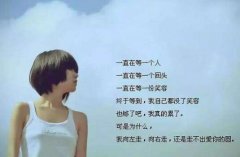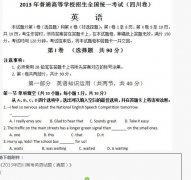2006-2013年高考英语四川卷(24)
C. To make Johnson Review popular. D. To introduce college life.
B
July 21, 2007 was a typical English summer’s day-it rained for 24 hours! As usual, I rushed home from work at midday to check on the house. Nothing was amiss. By the time I left work at 5 pm, however, the road into our village was flooded. Our house had never been flooded but, as I opened the front door, a wave of water greeted me. Thank God the kids weren’t with me, because the house was 5 feet deep in water. We lost everything downstairs. And the plaster had to be torn off the walls, ceilings pulled down.
At first we tried to push on through. We didn’t want to move the children out of home, so we camped upstairs. We put a sheet of plastic across the floor to protect us from the damp. But after three months, we felt very sick, so we moved to a wooden house in a park. The house was small, but at first we were all just delighted to be in a new place. Unfortunately, things took longer than expected and we were there for 10 months. The life there was inconvenient. What surprised me most was how much I missed being part of a community (社区). We had lived in a friendly village with good neighbors, and I’d never thought how much I’d miss that.
Although our situation was very had, it’s difficult to feel too sorry for yourself when you look at what’s happening elsewhere. I watched a news report about floods in Northern India and thought, “We didn’t have a straw hut(茅草房)that was swept away, and our house is still standing. We’re lucky.”
We moved back home in August. With December coming, there’s still reconstruction work to be done, so it’s difficult to prepare for Christmas, But I can’t wait — I’m going to throw a party for our friends in the village to say thanks for their support. This year, I won’t need any gifts — living away from home for months has made me realize how little we actually need or miss all our possessions. Although we are replacing things, there’s really no rush — we have our home back, and that’s the main thing.
45. What does the underlined word “amiss” in the first paragraph mean?
A. Wrong. B. Missing. C. Right. D. Found.
46. It can be inferred from the text that the author .
A. was sick of staying upstairs
B. cared much about her children
C. could not stand living in a wooden house
D. did not deal well with her family affairs during the flood
47. Why does the author say that they were lucky in the third paragraph?
A. Because her situation was not serious. B. Because many other places were flooded.
C. Because she had been to Northern India. D. Because some others suffered even more.
48. What does the author mainly want to express by telling her story?
A. She valued human feelings more than before.
B. She realized she almost didn’t need possessions.
C. She found Christmas gifts no longer badly needed.
D. She thought her own home was the most important.
C
Honesty comes in many forms. First there’s self-honesty. Is what people see the real article or do you appear through smoke and mirrors? I find that if I try to be something I’m not, I feel unsure of myself and take out a part from my PBA (personal bank account). I love how singer Judy Garland put it, “Always be a first-class version(版本)of yourself, instead of a second-class version of somebody else.”
Then there’s honesty in our actions. Are you honest at school, with your parents, and with your boss? If you’ve ever been dishonest, I think we all have, try being honest, and notice how whole it makes you feel. Remember, you can’t do wrong and feel right. This story by Jeff is a good example of that:
In my second year of study, there were three kids in my math class who didn’t do well. I was really good at it. I would charge them three dollars for each test that I helped them pass. I’d write on a little piece of paper all the right answers, and hand them off.
At first I felt like I was making money, kind of a nice job. I wasn’t thinking about how it could hurt all of us. After a while I realized I shouldn’t do that anymore, because I wasn’t really helping them. They weren’t learning anything, and it would only get harder down the road. Cheating certainly wasn’t helping me.
It takes courage to be honest when people all around you are getting away with cheating on tests, lying to their parents, and stealing at work. But, remember, every act of honesty is a deposit (储蓄) into your PBA and will build strength.
49.The underlined part “appear through smoke and mirrors” in the first paragraph means .
A. to be honest B. to be unreal
C. to become clear D. to come from an imagined world
50. Which of the following can best explain Judy Garland’s words?
A. Be your true self rather than follow others.
B. Don’t copy others or you can’t be the first class.
C. Make efforts to be the first instead of the second.
D. Don’t learn from others unless they’re excellent.
51. What does the author expect to show by Jeff’s story?
A. Honesty can be of great help.
B. A bad thing can be turned into a good one.
C. Helping others cheat can do good to nobody.
D. One should realize the wrong in his bad deeds.
52. In the last paragraph the author mainly wants to express .
A. one must be brave to be honest
B. it’s difficult to be honest when others are not
C. one should be honest when making a deposit
D. honesty in one’s actions can help him in the future
D
Cities alarmed by deaths and injuries of pedestrians are taking efforts to make crosswalks safer for people on foot, especially seniors and children who need more time to cross streets.
A pedestrian is killed in a traffic accident in the USA every 110 minutes; one is injured every nine minutes, according to official data. Crosswalks can be especially dangerous for the elderly. Among people 70 and older, 36% of pedestrian deaths in 2006 occurred in crosswalks, compared with 21% of those younger than 70, according to the Insurance Institute for Highway Safety.




